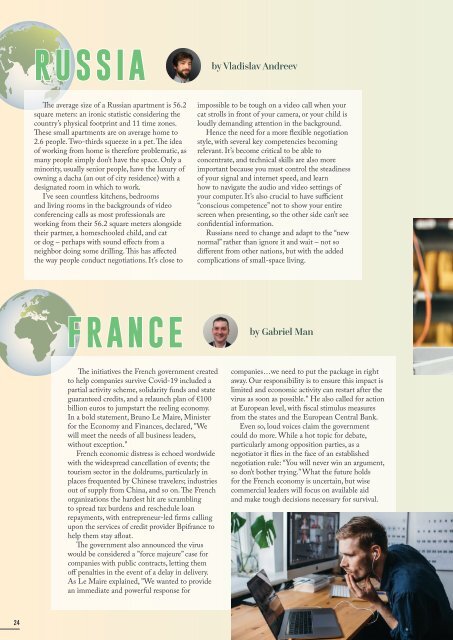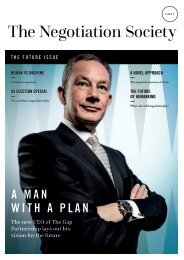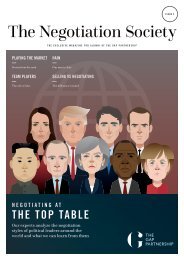The-Negotiation-Society-Magazine-The-Change-Issue
You also want an ePaper? Increase the reach of your titles
YUMPU automatically turns print PDFs into web optimized ePapers that Google loves.
RUSSIA<br />
by Vladislav Andreev<br />
<strong>The</strong> average size of a Russian apartment is 56.2<br />
square meters: an ironic statistic considering the<br />
country’s physical footprint and 11 time zones.<br />
<strong>The</strong>se small apartments are on average home to<br />
2.6 people. Two-thirds squeeze in a pet. <strong>The</strong> idea<br />
of working from home is therefore problematic, as<br />
many people simply don’t have the space. Only a<br />
minority, usually senior people, have the luxury of<br />
owning a dacha (an out of city residence) with a<br />
designated room in which to work.<br />
I’ve seen countless kitchens, bedrooms<br />
and living rooms in the backgrounds of video<br />
conferencing calls as most professionals are<br />
working from their 56.2 square meters alongside<br />
their partner, a homeschooled child, and cat<br />
or dog – perhaps with sound effects from a<br />
neighbor doing some drilling. This has affected<br />
the way people conduct negotiations. It’s close to<br />
impossible to be tough on a video call when your<br />
cat strolls in front of your camera, or your child is<br />
loudly demanding attention in the background.<br />
Hence the need for a more flexible negotiation<br />
style, with several key competencies becoming<br />
relevant. It’s become critical to be able to<br />
concentrate, and technical skills are also more<br />
important because you must control the steadiness<br />
of your signal and internet speed, and learn<br />
how to navigate the audio and video settings of<br />
your computer. It’s also crucial to have sufficient<br />
“conscious competence” not to show your entire<br />
screen when presenting, so the other side can’t see<br />
confidential information.<br />
Russians need to change and adapt to the “new<br />
normal” rather than ignore it and wait – not so<br />
different from other nations, but with the added<br />
complications of small-space living.<br />
FRANCE<br />
by Gabriel Man<br />
<strong>The</strong> initiatives the French government created<br />
to help companies survive Covid-19 included a<br />
partial activity scheme, solidarity funds and state<br />
guaranteed credits, and a relaunch plan of €100<br />
billion euros to jumpstart the reeling economy.<br />
In a bold statement, Bruno Le Maire, Minister<br />
for the Economy and Finances, declared, "We<br />
will meet the needs of all business leaders,<br />
without exception."<br />
French economic distress is echoed wordwide<br />
with the widespread cancellation of events; the<br />
tourism sector in the doldrums, particularly in<br />
places frequented by Chinese travelers; industries<br />
out of supply from China, and so on. <strong>The</strong> French<br />
organizations the hardest hit are scrambling<br />
to spread tax burdens and reschedule loan<br />
repayments, with entrepreneur-led firms calling<br />
upon the services of credit provider Bpifrance to<br />
help them stay afloat.<br />
<strong>The</strong> government also announced the virus<br />
would be considered a "force majeure” case for<br />
companies with public contracts, letting them<br />
off penalties in the event of a delay in delivery.<br />
As Le Maire explained, "We wanted to provide<br />
an immediate and powerful response for<br />
companies…we need to put the package in right<br />
away. Our responsibility is to ensure this impact is<br />
limited and economic activity can restart after the<br />
virus as soon as possible." He also called for action<br />
at European level, with fiscal stimulus measures<br />
from the states and the European Central Bank.<br />
Even so, loud voices claim the government<br />
could do more. While a hot topic for debate,<br />
particularly among opposition parties, as a<br />
negotiator it flies in the face of an established<br />
negotiation rule: “You will never win an argument,<br />
so don’t bother trying.” What the future holds<br />
for the French economy is uncertain, but wise<br />
commercial leaders will focus on available aid<br />
and make tough decisions necessary for survival.<br />
24
















